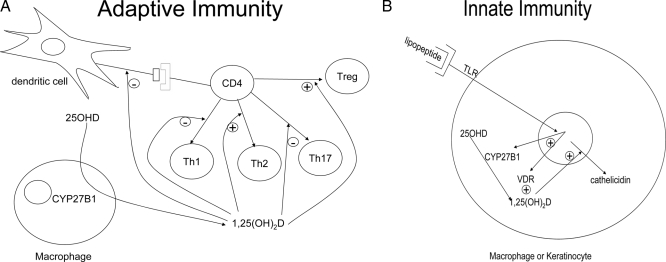Figure 3.
Regulation of immune function by 1,25(OH)2D. 1,25(OH)2D suppresses adaptive immunity (A) by inhibiting the maturation of dendritic cells, reducing their capacity to present antigen to CD4 cells. 1,25(OH)2D further inhibits the proliferation and differentiation of CD4 cells into Th1 and Th17 cells and promotes the production of Th2 and Treg cells. On the other hand 1,25(OH)2D promotes innate immunity (B) in that when the macrophage is activated by TLRs, VDR and CYP27B1 are induced enabling the macrophage to produce 1,25(OH)2D, which then induces cathelicidin, a potent antimicrobial peptide.

